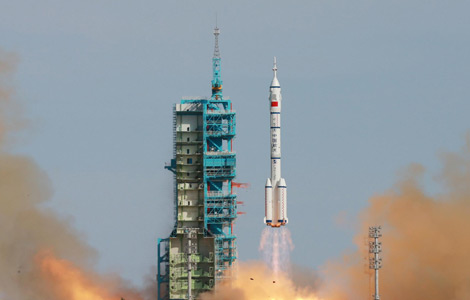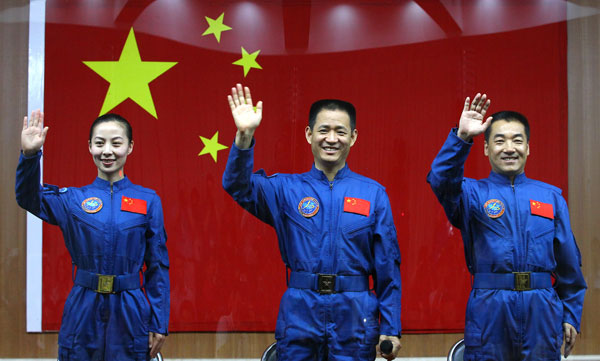China successfully sends first space teacher into orbit
Updated: 2013-06-11 18:36
(Xinhua)
|
||||||||
|
 Shenzhou-X, atop an upgraded Long March-2F carrier rocket, blasts off from the Jiuquan Satellite Launch Center in northwest China at 5:38 p.m. Tuesday.
|
JIUQUAN - China on Tuesday afternoon successfully sent its first astronaut-teacher into space aboard its Shenzhou-X spacecraft.
Three astronauts are on board the spacecraft -- commander Nie Haisheng; Zhang Xiaoguang, assistant to Nie; and female crew member Wang Yaping, who will broadcast a lecture to students on Earth about physics from a space laboratory 300 km above the ground.
Shenzhou-X, atop an upgraded Long March-2F carrier rocket, blasted off from the Jiuquan Satellite Launch Center in northwest China at 5:38 p.m. Tuesday.
Wang will teach about motion in a microgravity environment, the surface tension of liquid, and help students understand the concepts of weight and mass and Newton's Laws. She will also demonstrate while lecturing in orbit, and interact with students and teachers on Earth.
Her two fellow crew members will act as cameramen and assistant during the lecture.
"We are all students in facing the vast universe," said Wang on Monday when meeting journalists. "We are looking forward to joining our young friends to learn and explore the mystical and beautiful universe."
Born in east China's Shandong Province, the hometown of China's most famous educationist Confucius (551-479 BC), the 33-year-old Wang is the second Chinese female astronaut after Liu Yang, who entered the record books in the Shenzhou-9 mission in June last year.
| Special report |
Wang was recruited to the PLA in August 1997 and became a member of the Communist Party of China in May 2000. Currently, she is a major.
Course materials, teaching aids and a classroom for the lesson have been prepared, while Wang has had relevant training sessions.
Systematic and thorough plans have been made for the lesson in coordination with the Ministry of Education, the China Association for Science and Technology, and China Central Television (CCTV), the state broadcaster.
A new observation and control network, which was established in July 2012, will provide support in communication for the lesson, which is to be broadcasted live through CCTV.
The time of the lesson will be decided according to the mission's schedule, and technical conditions during the assembly of Shenzhou-X and Tiangong-1, a target orbiter and space laboratory.
The lesson is aimed at making space more popular, as well as inspiring enthusiasm for the universe and science, according to Zhou Jianping, designer-in-chief of China's manned space program, who added that the lesson will also accumulate experience for similar larger activities.
"The spirit of science of the youth is an important drive for the progress of mankind," said Zhou. "Space activities can help them build up the spirit of seeking science and facing challenges."
The world's first teacher in space was Christa McAuliffe, a 37-year-old middle school teacher from the United States, but the Space Shuttle Challenger disintegrated after 73 seconds in flight on January 28, 1986. McAuliffe and her other six crewmates were killed.
 |
|
Astronauts of the Shenzhou-X mission, Wang Yaping, Nie Haisheng and Zhang Xiaoguang (from left to right), meet the press in Jiuquan Satellite Launch Center on Monday. ZOU HONG / CHINA DAILY |
Barbara Morgan, McAuliffe's backup in that mission who became an astronaut later, completed the teaching lesson in space in 2007, when she was sent to the International Space Station with Space Shuttle Endeavor. Via a video feed, she showed students how to exercise and drink water in space.
Wang will also be responsible in this mission for monitoring the conditions of the spacecraft, space experiments, operation of equipment and taking care of fellow crew members.

 Michelle lays roses at site along Berlin Wall
Michelle lays roses at site along Berlin Wall
 Historic space lecture in Tiangong-1 commences
Historic space lecture in Tiangong-1 commences
 'Sopranos' Star James Gandolfini dead at 51
'Sopranos' Star James Gandolfini dead at 51
 UN: Number of refugees hits 18-year high
UN: Number of refugees hits 18-year high
 Slide: Jet exercises from aircraft carrier
Slide: Jet exercises from aircraft carrier
 Talks establish fishery hotline
Talks establish fishery hotline
 Foreign buyers eye Chinese drones
Foreign buyers eye Chinese drones
 UN chief hails China's peacekeepers
UN chief hails China's peacekeepers
Most Viewed
Editor's Picks

|

|

|

|

|

|
Today's Top News
Shenzhou X astronaut gives lecture today
US told to reassess duties on Chinese paper
Chinese seek greater share of satellite market
Russia rejects Obama's nuke cut proposal
US immigration bill sees Senate breakthrough
Brazilian cities revoke fare hikes
Moody's warns on China's local govt debt
Air quality in major cities drops in May
US Weekly

|

|







